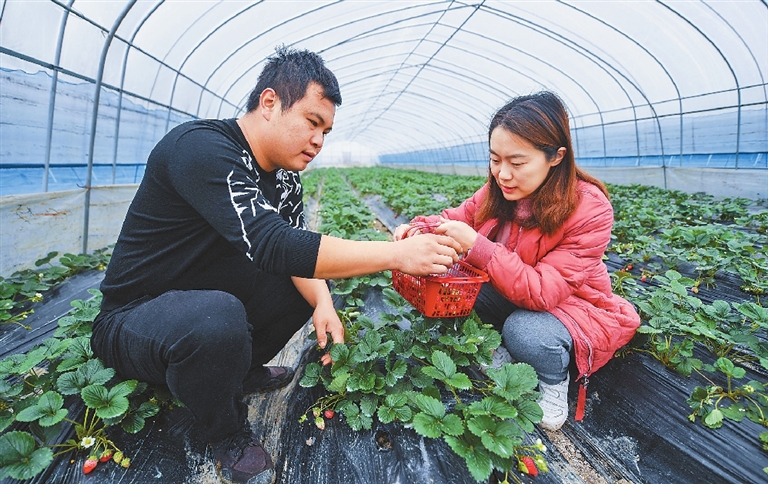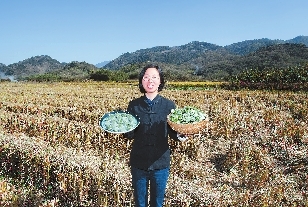

WANG XIN, 33, is a landscape designer by trade and farmer in practice. The strawberries from his organic plantation in the southern outskirts of Beijing are believed by his clients to be “the best in China.” Every day in Beijing, while men and women of his age are stuck in heavy traffic and endless meetings, Wang lives a quiet life in the countryside, far from the maddening crowds. He rises with the sun and works all day in the field or goes to a farmers’ market to sell fresh produce. At the end of the day, he goes to bed with sore muscles and falls into a deep sleep. He does not take the time to consider whether it is hard work, preferring to get on with the job. “It has become a lifestyle. This is the life I chose to live,” he says. In a country where food is so central to culture, many well-educated city dwellers like Wang have returned to the countryside to dedicate themselves to cultivating fresher, healthier eating options. Research farmers Every Tuesday, Saturday and Sunday, Wang brings freshly picked strawberries to an organic farmers’ market in Beijing. The fruits are grown naturally in nutrient-rich soil, without the use of fertilizers, pesticides, growth hormones or chemicals. “I don’t plan to be filthy rich, or I wouldn’t have gone for organic farming,” Wang said. With his firm athletic build and healthy tan, it is hard to imagine that he was once a designer who spent days and nights toiling in front of a computer screen. With a degree in landscape botany, Wang has always been a plant lover. When he was 25, he realized his sedentary lifestyle was making him put on weight, and he could no longer stand being an office drone. He quit his job, rented two plantation sheds in the suburbs and started his farming career from scratch. On Tuesday, Wang presented this winter’s first batch of fruit, which he planted in September. But the work had really begun in July when he prepared all-natural organic matter to enrich the soil. This fertilizing formula has been perfected through years of research in collaboration with Beijing University of Agriculture to simulate the formation of the fertile dark forest soil in Northeast China, known for its high crop productivity. Logically, the true foundation of organic farming lies in soil content: if the soil is right — if it is a living organism with a complex organic structure — the outcome is safe and tasty food farmed without the need for fertilizing chemicals, according to Wang. But quality produce is not the only objective. Wang hopes to build a production model that rehabilitates the soil itself. On regular plantations, the soil can degrade within a matter of years after being over-exploited. Wang’s work on his farm has not always been a smooth ride. But after a rough start he now believes he has learned valuable lessons. He has gone back to his university and visited his colleagues in Tochigi Prefecture, Japan, to study the most modern organic farming techniques. “For organic farming to become truly sustainable, revitalizing the soil is key. I am certain that in three to four years, the soil that I have been reviving will only be healthier,” he said. Wang is not alone in his quest after healthy crop yields. In Araxan, a semi-arid region located in Northwest China’s Inner Mongolia Autonomous Region, Ma Yanwei has spent years reinvigorating saline soil by applying water-saving methods to cultivate fruit and crops suitable for local conditions. Sweet melon is the best-selling produce on Ma’s farm. The sweetness of the melons comes from many years of study, experimentation and hard work in the desert. Ma aims to find the ideal organic farming methodology that both maximizes the utilization of scarce water resources and mends the soil. “As long as the soil improves, it is natural to harvest healthy produce,” Ma said. In the last six years, he has seen more and more young people returning to the countryside to take on farming. In 2017, Ma set up a network where these new farmers can communicate, exchange experiences and help each other “so we could avoid longer detours and mistakes previously made by others,” he said. An idyllic farm rebuilt For 18 years, Zhang Zhimin, a former foreign trade expert, has been building an idyllic farm in the far southwestern end of Beijing to produce food and preserve biodiversity. Zhang, who speaks several languages, was designated to work in food imports and exports when China opened its market to the world outside. She believes that “agriculture is the art of man and nature working together.” On her bio-farm, nature rules over man. Instead of eliminating weeds and pests, the wholesome biosphere works on its own to render seasonal harvests. “Agriculture is the management of life, and life should be nourished by life itself,” she said. On her farm called Heaven’s Blessings, trees, bushes, grass, insects, birds and cattle coexist in harmony. It is more like a habitat than a farm. In the early summer she chops the tender leaves and branches of weeds that grow under peach trees and feeds it to cattle to make room for the gramineous crops to thrive. In early autumn, she lets the cows roam free to finish the weeding. In Wang’s vegetable shed, the natural ecosystem makes for a healthy harvest, making intervention from the outside unnecessary. “I have observed that the grass that coexists with the crops functions as a regulating factor of the microclimate by keeping the soil humid,” Wang said. Also, a native breed of spiders that leaves webs among the vegetables feeds on the whiteflies that are usually hard to detect due to their miniscule size, preventing the need for harmful insecticides. Wang has also gone back to ancient Chinese agricultural traditions to find inspiration for better coordinating his human efforts with nature after learning about the latest farming models from Japan, Germany and Israel. At a Farmers’ Assembly meeting held in the China Agricultural University (CAU) in December 2018, Professor Meng Fanqiao with CAU’s College of Resources and Environmental Sciences said organic/ecological farming is an important measure for improving the quality and safety of agricultural products. “Organic/ecological farming is of vital significance for economic development as well as environmental protection in rural areas, for which it should play an imperative role in China’s rural revitalization and the building of an ‘ecological civilization,’” Meng said. “The green development of the countryside is a strategy that goes hand-in-hand with food supply security and income level improvement,” said Jin Shuqin with the Ministry of Agriculture’s Research Center for Rural Economy. “To revivify the ecosystem constitutes a crucial aspect of overall rural revitalization.” “It is our hope to promote healthy eating and make it become a mainstream choice, as well as the organic way to produce healthy foods,” said Ma Xiaochao, project officer with Know Your Food, a self-publishing community focused on food sustainability. (Xinhua) | 
